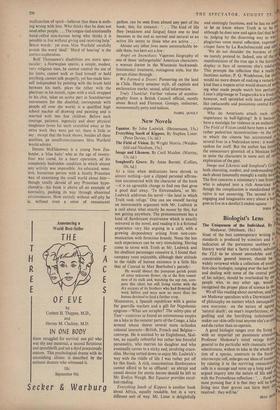New Novels
AT a time when dedications have shrunk to almost nothing—just a clipped personal affirma- tion unconnected with the character of the book —it is an agreeable change to find one that gives a good deal away. To Extremadura,' so Mr. Lodwick addresses his novel—`the land in which Truth took refuge.' One can see oneself having an interminable argument with Mr. Lodwick in a café about what exactly he meant by this, but not getting anywhere. The pronouncement has a kind of flamboyant evasiveness which is exactly mirrored in the novel, and reading it is a fictional experience very like arguing in a café, with a growing despondency arising from non-com- munication with ferocious brandy. None the less such experiences can be very stimulating. Having come to terms with Truth as Mr. Lodwick and his ebullient personages conceive it, I found their company most enjoyable, although their attitude to the riddle of human existence is a little like that of Conrad in Max Beerbohm's parody : He would dissect the pompous garish petals of some unknown flower, rip at the firm round- ness of its stalk and, watching the sap run, com- pare this silent but still living victim with the dry corpses of its brothers who had flowered the week before and were now no more than the humus destined to feed a further crop.
Matamoros, a Spanish republican with a genius for guerrilla warfare and a gift for Napoleonic epigram—'What are scruples? The safety-pins of Fate'—contrives to found an autonomous empire on a lake in the remoter parts of the Congo, a lake around whose shores several more orthodox colonial interests—British, French and Belgian— converge. He is assisted by an Englishman, Skel- ton, an equally colourful but rather less forceful personality, who marries his daughter and who eventually comes to a sticky end, involving croco- diles. Having settled down to enjoy Mr. Lodwick's way with the riddle of life I was rather put off by this finale. A rich, conscientious flamboyance cannot afford to be so offhand : an abrupt and casual demise for exotic heroes should be left to Mr. Evelyn Waugh. But Equator provides excel- lent reading.
Everything Smelt of Kippers is another book about Africa, equally readable, but in a very different sort of way. Mr. Lister is delightfully and untiringly facetious, and he has no art to let us know where Truth is to be f ' although he does now and again feel that he to, judging by the disarming way in wive' plagiarises some moral reflection, expressed crisper form by La Rochefoucauld and otb `We do not shoulder the burdens of et we merely pretend to. Indeed, one of the uw manifestations of the true ego is the fortitud/ display in face of someone else's misfort This prompts the reflection that a really facetious author, P. G. Wodehouse, for ins would no more dream of making a remark , kind than a trapeze artist would dream of Wo ing what made people watch him perforot Lister's pilgrimage to Tanganyika is a livelYS however, well sprinkled with local predica1 like coelacanths and passicinate central Ent° expatriates.
Why do Americans attach such sYol importance to bull-fighting? Is it because have a nostalgia for violence in an :esthetic The Field of Vision could have been a sensi rather pedestrian reconstruction—in the ma to which the cinema has accustomed us several lives in a Nebraskan town : it would spoken for itself. But the author has introd the unnecessary gimmick of a Mexican ball to unite the characters in some sort of laY exploration of the past. Image and Likeness and Songberd's Grove both charming, modest, and undemanding b each about (unusually enough) a really nice The first concerns a missionary's son from who is adopted into a rich American fa though the complication is standardised the rative is not unmoving. The second is a engaging and imaginatiVe story about a boY goes to live in a derelict London square. JOHN 0'1






























 Previous page
Previous page